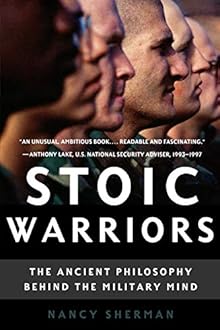Why is Stoicism so popular in the US Army?
 I've noticed, during the research for my upcoming book on how people use ancient philosophy in modern life, how many of the Stoics I interviewed were or are soldiers (or cops, or firemen). Why is that? I asked Nancy Sherman, professor of ethics at Georgetown University and the author of Stoic Warriors, which looks at Stoicism in the armed forces. She replied:
I've noticed, during the research for my upcoming book on how people use ancient philosophy in modern life, how many of the Stoics I interviewed were or are soldiers (or cops, or firemen). Why is that? I asked Nancy Sherman, professor of ethics at Georgetown University and the author of Stoic Warriors, which looks at Stoicism in the armed forces. She replied:
There's a popularization of stoicism with a small s in our culture - the idea of being self-sufficient and self-reliant. In that sense, the word 'stoic' has survived in the popular vernacular. It has little to do with Stoicism. But Stoicism is also a natural fit for the military, in the sense of sucking it up, the stiff upper lip, and so on. Being a soldier is about deprivation, survival, the minimization of need and attachment. So Stoicism suits them.
In the US Navy and the military at the academy level, Admiral James Stockdale was also a popularizer of Stoicism. Epictetus and Marcus Aurelius are particularly popular, because they're accessible. And Aurelius was a soldier and emperor, which impresses military people.
Do you think Stoicism can be a harmful ethos?
I think the little s stoic ethos of 'suck it up and chuck on' can be harmful. It's a form of abstinence and denial. Your body goes into it naturally when you go into stressors. But it's also inculcated by the command. You're seen as a sissy if you cry, and a wimp if you go for therapy. If it's linked with a certain macho denial of emotions, then it can be extremely harmful. It minimises all the emotions that are desirable in peace time.
Have a look at this opinion piece Professor Sherman wrote for the New York Times on the harmful impact of an unexamined stoic attitude in the military.
Here's Admiral James Stockdale's account of how he used Stoicism to survive seven years in a Hanoi POW camp. Part 1, and Part 2.
And here's a video of Major Thomas Jarrett talking about his Stoic Warrior Resilience course, which he taught during the Iraq war.
